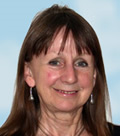Barbara Jaworski | SMEC 2010
 Professor Barbara Jaworski
Professor Barbara Jaworski
Seeking an Inquiry Culture in Mathematics Teaching
In recent years my research has been focused on the use of inquiry to develop mathematics teaching (at all levels), largely in an inquiry community of mathematics educators and mathematics teachers. Most recently I am focusing on mathematics teaching at university level, particularly in a community including mathematicians and mathematics educators.
Community may be conceptualised in Wenger's terms of 'community of practice' in relation to 'mutual engagement', 'joint enterprise' and 'shared repertoire'; further, 'belonging' to a community of practice involves 'engagement', 'imagination' and 'alignment'. Along with colleagues in recent research, I have extended Wenger's theoretical constructions to include an inquiry way of being within a community of practice: thus constituting a 'community of inquiry' and encouraging an inquiry culture in mathematics learning and teaching. An essential part of such a community of inquiry is the construct of ‘critical alignment' in which we look critically into what we are doing as we align with its norms and expectations.
I shall address the design of teaching, and concomitant research, that seeks to promote mathematical learning within a range of contexts in which teachers align with norms and expectations within a well established community of practice (school or university). I will discuss forms of pedagogy to encourage the use of inquiry as a learning tool and a way of being leading to development of an inquiry culture supporting mathematical learning and understanding.
I will point to current research that is exploring teaching at a range of levels and focus particularly on research in which teachers design mathematical activity for students, using collaborative inquiry and explore the developmental outcomes of design implementation. Here the design of teaching and the design of research go hand in hand, and the dynamic process of learning about teaching goes on alongside a critical scrutiny of students' development of understanding in mathematics and analysis of data em erging from survey, interview and observation.
